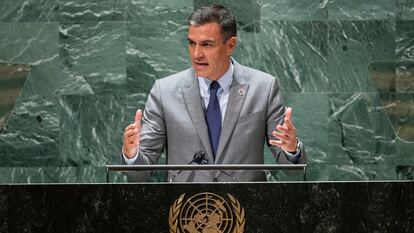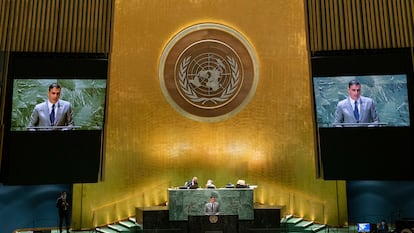Spanish PM makes plea for multilateralism at tense UN meeting in New York
Pedro Sánchez pledged more Covid-19 vaccines for needy countries and urged action on climate change

The volcanic eruption in La Palma, in Spain’s Canary Islands, has forced Spanish Prime Minister Pedro Sánchez to minimize his presence at the United Nations General Assembly annual debate in New York.
Addressing world leaders on Wednesday, Sánchez used the few hours at his disposal to play the role of mediator at a summit that was particularly tense, and where the Spanish PM defended the virtues of multilateralism at a time of growing nationalism.
The enemy of multilateralism is extremismSpanish Prime Minister Pedro Sánchez
The head of the Spanish Socialist Party (PSOE) also announced that Spain will donate 30 million Covid-19 vaccines to countries that need them, particularly in Latin America because of historical, cultural and economic ties. Sánchez said Spain has already delivered 7.5 million doses to the region – which has a population of 650 million – and will soon ship another 7.5 million.
Sánchez, who heads a minority government in tandem with the leftist party Unidas Podemos, delivered a progressive speech that underscored the need to fight inequality and also backed the idea of a global minimum corporate tax of 15%, which is defended by 130 countries according to the Organization for Economic Cooperation and Development (OECD).
“We want to fight against poverty and exclusion in all its forms, in Spain and the world, by reforming our development model in order to make it more sustainable,” he said in a speech that contained elements of his personal life. “My political calling was born from a lesson my grandfather gave me that I will never forget, and which is especially valuable in these times: that inequality only creates poverty in the long run, and that what’s fair for all is always beneficial to all.”
On the subject of the Covid-19 pandemic, Sánchez noted that the virus also followed patterns of inequality. “The poorest regions did not have the healthcare infrastructure to contain the disease nor the resources to lift a social shield to protect citizens from the economic crisis,” he said. “That is why I am calling for a defense of strong, resourceful states that can guarantee the wellbeing of their citizens based on values of justice, progress and equality.”

Sánchez spoke against patent rights, saying that they “can never be an obstacle to addressing this global health emergency. Therefore, I reiterate my call to resolve bottlenecks in production and distribution, including a possible temporary waiver on [Covid-19] vaccine patents and the elimination of obstacles throughout the value chain.”
He also urged world leaders to “defend democracy as the only alternative to totalitarian, exclusionary and intolerant drifts. And I call upon international cooperation and multilateralism as the only way to provide real solutions to the challenges facing the world today.”
The core of Sánchez’s speech was a defense of multilateralism and democracy, which he views as under threat from extremist agendas. “History has taught us that no country can achieve any major milestone from a unilateral, individualistic position, isolating itself in the midst of a globalized world. The enemy of multilateralism is extremism; let us not allow ourselves to be deceived by those espousing selfishness and individualism,” he said.
On climate change, the Spanish leader alluded to recent wildfires, droughts, floods and other extreme weather events to note that “the climate emergency is the overriding crisis of our times. There is no room left for denial.” He said that Spain has made the climate crisis “an absolute priority of its government action: 40% of the investments envisaged in our Recovery, Transformation and Resilience Plan [based on funds from the European Union’s Next Generation EU coronavirus recovery plan] will be allocated to the ecological transition. By 2030, 74% of the electricity we generate, and 42% of the total energy we consume, will come from renewable sources.”
But Sánchez’s rhetoric of global cooperation was in contrast with the tone set by several other leaders at the assembly. Reflecting the concern, UN Secretary General Antonio Guterres delivered a stark address that talked about “the highest global geo-strategic tensions in years” as well as “deep and growing global mistrust.”
English version by Susana Urra.
Tu suscripción se está usando en otro dispositivo
¿Quieres añadir otro usuario a tu suscripción?
Si continúas leyendo en este dispositivo, no se podrá leer en el otro.
FlechaTu suscripción se está usando en otro dispositivo y solo puedes acceder a EL PAÍS desde un dispositivo a la vez.
Si quieres compartir tu cuenta, cambia tu suscripción a la modalidad Premium, así podrás añadir otro usuario. Cada uno accederá con su propia cuenta de email, lo que os permitirá personalizar vuestra experiencia en EL PAÍS.
¿Tienes una suscripción de empresa? Accede aquí para contratar más cuentas.
En el caso de no saber quién está usando tu cuenta, te recomendamos cambiar tu contraseña aquí.
Si decides continuar compartiendo tu cuenta, este mensaje se mostrará en tu dispositivo y en el de la otra persona que está usando tu cuenta de forma indefinida, afectando a tu experiencia de lectura. Puedes consultar aquí los términos y condiciones de la suscripción digital.









































